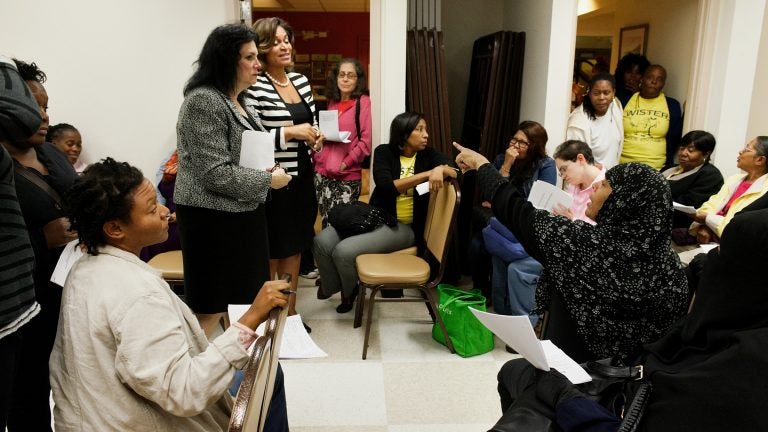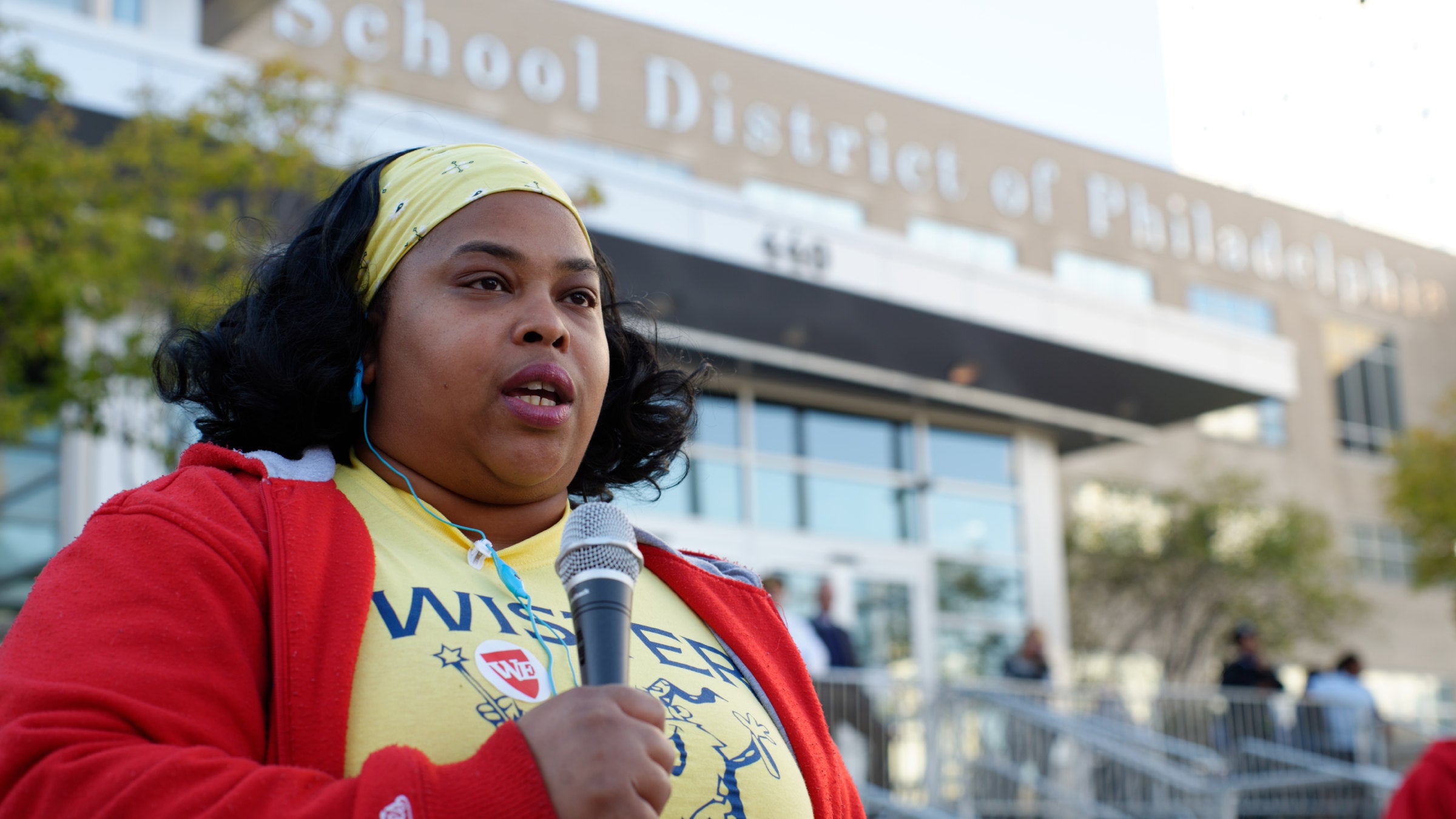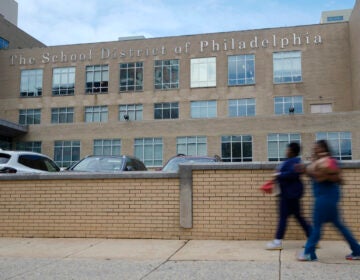Hite endorses handing two Philly schools to charters — changes course on Wister
Listen
During a meeting in October, some Wister Elementary School parents criticize the proposed charter conversion of their school. (Bastiaan Slabbers/for NewsWorks)
Philadelphia School District superintendent William Hite has selected two charter school operators to take over operations at two district elementary schools through the Renaissance initiative.
Hite’s recommendation matches West Philadelphia’s Huey Elementary with Global Leadership Academy and Logan’s Cooke Elementary with the Great Oaks Foundation.
Hite originally pitched converting Wister Elementary in Germantown as well. Mastery Charter applied to operate the school. Monday, in a surprising reversal, Hite recommended the school remain under district control.
The School Reform Commission will make final determination on Cooke and Huey at a Jan. 21 meeting.
Of the four charter organizations that applied for consideration this year, only Mastery has a track record doing neighborhood-based conversions in Philadelphia. It’s been by far the top performer among city charter providers who engage in turnaround work.
Hite said each of his decisions were influenced by community input, as well as last week’s release of School Progress Report data – which weights “progress” most heavily.
Wister saw a large jump in its “progress” score. It rated 29 out of 59 in its citywide group and scored 10 out of 20 among schools considered to be peers. Overall, this bumped the school up from “intervene” to “watch.”
Hite didn’t believe he should greenlight intervention at a “watch” school when so many others fall into the “intervene” category.
“That school is moving in the right direction,” said Hite. “We only have finite resources….we felt that there are schools that are lower-performing than Wister that would need this level of investment.”
Hite said his decision was very difficult given Mastery’s reputation, and the fact that the school evaluation committee rated it highly.
“Mastery has shown strong evidence of success, had a very good application for this school,” he said. “This was more about what was happening at Wister, and the fact that we saw evidence of growth there.”
Hite said all other options for intervention at Wister will be considered – including in-district turnaround, partnering with outside agencies and/or reconstituting the school or its staff.
“Everything is on the table except for renaissance charter conversion,” said Hite.
School Progress Report data also influenced Hite’s thinking at Cooke and Huey. Overall, both rated “intervene.”
Cooke’s “progress” score rose slightly. Its rankings in “achievement” and “climate” fell. It was rated 135 of 140 in its citywide group and last in its peer group.
Huey saw “climate” ratings rise slightly, “progress” flatline, and “achievement” drop. Overall, it rated 99 of 140 in its city group, and 21 of 46 in its peer group.
The district measures “progress” using the state’s “value added” metric, PVAAS, which tracks year-to-year student performance on state standardized tests as compared with peers.
Complicating this, though, is that the state tests changed dramatically between this year and last. The Pennsylvania Department of Education says the most recent scores should be considered the “new baseline.” Based on this reasoning, PDE decided not to assign school performance profile scores this year.
Toggling between 2015 and 2014 data on the state’s PVAAS site shows how wildly growth scores can swing from year to year.
Hite defended the decision to use PVAAS in the district’s ratings this year and restated his commitment to the integrity of the SPR data.
“Because the assessment changed does not mean that you cannot measure growth,” he said.
Reactions
The proposed conversions have been the topic of fierce debate at School Reform Commission meetings in recent months. Each school has seen parents and advocates pushing both for and against conversion.
Wister was home of the most coordinated campaign to keep the school within district control. Community member Coleman Poses correctly pointed out that the district relied on faulty enrollment data in its pitch to convert the school.
 Kenya Nation, a parent at John Wister Elementary, speaks against a charter conversion for the school. (Bastiaan Slabbers/for NewsWorks)
Kenya Nation, a parent at John Wister Elementary, speaks against a charter conversion for the school. (Bastiaan Slabbers/for NewsWorks)
Wister parent Kenya Nation Holmes praised the superintendent’s decision. She had advocated against the conversion largely based on what she saw as the unilateral nature of Hite’s original proposal.
“I don’t hate Mastery. I just hate the way [the district] went about it,” said Holmes. “Having been through the process, I feel great that I showed my kids that if you stand up for what you believe, you can accomplish it.”
Holmes hopes Wister can be one of the 25 “community schools” envisioned by Mayor Jim Kenney and Council President Darrell Clarke.
“Now that it’s over, we’re going to start fixing the school…and we’re going to find the extra funding that we need,” she said.
Not all Wister parents were happy with the decision.
Alisha Grant, mother of a second grader, said she’ll withdraw her child from the school if Hite doesn’t change his mind. “I think we deserve better, and now it was taken right from underneath us,” she said.
Mastery itself was baffled by the decision. Wister’s high marks in “progress” were driven mainly based on performance on the state math test. Even with that progress, only three percent of Wister’s students scored proficient or higher in math.
“We urge Dr. Hite and SRC members to meet with the evaluation committee and parents to explain their decision and to hear parents’ concerns before deciding Wister’s Renaissance status,” Mastery wrote in a statement.
Wider reaction among education advocates fell along predictible lines.
Newly sworn in city councilwoman Helen Gym, a major opponent of a previous Mastery turnaround attempt, lauded the decision at Wister and criticized those at Cooke and Huey.
“In our data-driven environment it’s critically important to stand for a vision of public education that moves beyond test scores and aims to meet the needs of all children in all schools,” wrote Gym in a statement.
Philadelphia Federation of Teachers president Jerry Jordan said the decisions at Cooke and Huey evidenced a commitment to “the now-defunct No Child Left Behind reform model.”
“Withhold the resources schools need to provide children with counselors, teachers, nurses, librarians, art, music and other essential offerings. Then, when student achievement falters, use it as an excuse to outsource the education of our children to outside firms,” Jordan wrote in a statement.
Philadelphia School Partnership executive director Mark Gleason blasted the Wister decision as somehow politically motivated.
“Even though four out of five kids at Wister aren’t learning to read, the District has said ‘no’ to accountability for families and ‘yes’ to special interest politics,” said Gleason.
PennCAN executive director Jon Cetel warned of ripple effects in the state capitol.
“Today’s decision just made it even harder for PennCAN to convince skeptical Republicans that the School District of Philadelphia is serious about using its new revenue to transform its chronically under-performing schools,” he said.
‘The whole picture’
Great Oaks — which runs four schools in Newark, New Jersey; New York City; Bridgeport, Connecticut; and Wilmington, Delaware — was the only charter operator to express interest in Cooke.
The chain makes “high-dosage tutoring” a centerpiece of its model. In addition to a full-time staff, Great Oaks hires AmeriCorps volunteers to act as full-time tutors, providing them housing and a small stipend.
Former Great Oaks Superintendent Christina Grant became the assistant superintendent of the district’s “opportunity network” of schools last summer.
Great Oaks president Michael Duffy, the former head of the charter office in New York City’s Department of Education, also served as the managing director of Victory Education Partners – a for-profit operator that ran six schools in Philadelphia starting in 2002.
By 2011, the School Reform Commission ended all of its contracts with outside managers, including Victory.
The district received two letters of interest to take over operations at West Philadelphia’s Huey Elementary.
One came from the leaders of West Philadelphia’s Global Leadership Academy, a K-8 lottery-based charter school serving 700 students.
Global Leadership CEO Naomi Booker, a graduate of Huey, said parents could look forward to smaller class sizes and a “non-negotiable” commitment to art and music.
Booker, who spent 34 years as an employee of the district, was the principal of Clymer Elementary in the 1990s before becoming a regional superintendent.
Booker came to Global Leadership Academy five years ago when it was known as Rising Horizons Quest charter. She changed the name, bolstered its reputation and moved the school beyond its criminal past.
“I know that I can turn that school around as well,” she said of Huey in a December interview. “What’s important to me is to put as much money as possible toward the service of the children, not toward administration.”
Global Leadership Academy rated in the bottom tier of the district’s school progress report this year, earning a “watch” designation, the district’s second lowest.
For “achievement,” it rated 55 of 140 among all city K-8 elementary schools, and second from last in “progress.” GLA did receive a “model” rating for “climate,” placing second in its peer group.
“It is a school that’s not an “intervene,” said Hite of GLA. “They have been doing some pretty significant work there.”
West Philadelphia pastor Pamela Williams praised Hite’s decision. Originally, Williams had testified passionately against the conversion – threatening at an SRC meeting to “shut this city down” if the district moved forward with its plan.
After reviewing the data and visiting GLA, she changed her mind, and now believes Booker will “bring life back into the 52nd street community.”
“It is quite natural to protest and struggle when you have not seen the whole picture,” said Williams. “But I have seen the whole picture, and I know that the school district at this point, in my mind, is incapable of turning Huey around.”
The Minneapolis-based for-profit charter management organization SABIS also had forwarded a bid for Huey. In addition to running private schools internationally, SABIS operates 12 public charter schools serving 8,000 students in Massachusetts, New Jersey, Michigan, Ohio, Louisiana, and Arizona.
WHYY is your source for fact-based, in-depth journalism and information. As a nonprofit organization, we rely on financial support from readers like you. Please give today.





